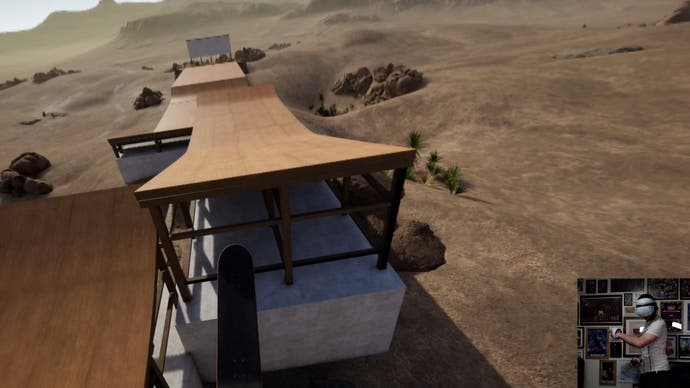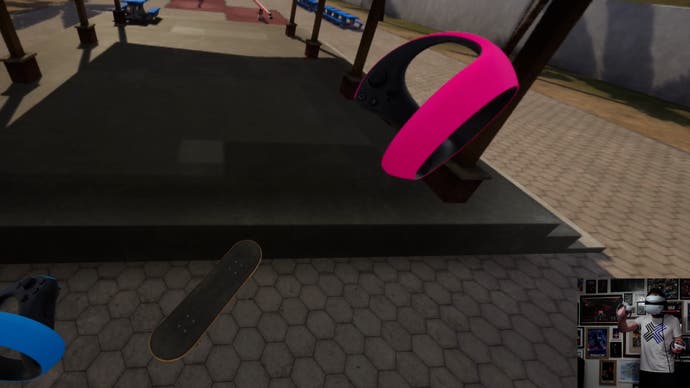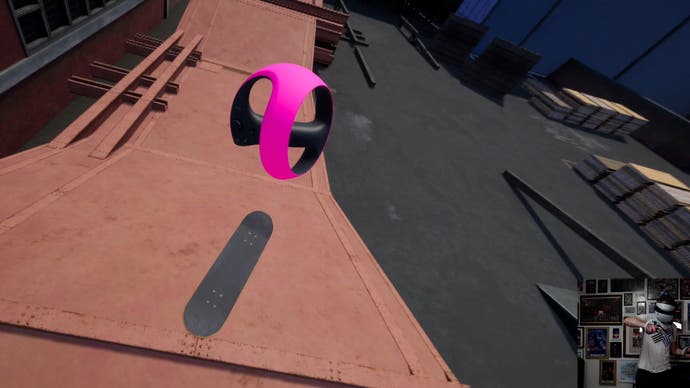I’ve got so many fond memories of playing Tony Hawk’s Pro Skater on the PS1. Those heady, hazy days spent huddled around a small TV as me and my pals chatted nonsense and competed for high scores to the tunes of the game’s punk rock soundtrack were so carefree and full of laughter.
It feels like those days of shoulder-to-shoulder pass-the pad action are long gone now though, and they’re something that I’m not sure modern generations will ever get to experience in the way that I did. You know, what with that there speedy internet and all the other futuristic nonsense we have now.
But of course with every loss caused by futuristic nonsense comes a gain, and this particular gain is virtual reality, which is something that has allowed VR Skater to be a thing that exists. VR Skater is a VR skateboarding game (obviously) that does a very good job of translating that ever so moreish gameplay loop of a Tony Hawk’s game into a virtual reality experience and for this week’s episode of VR Corner (above) you can watch me play through a preview build of the upcoming PSVR2 port.

If the name VR Skater sounds familiar to you, that might be because DEFICIT’s game has been grinding its way through Steam Early Access since 2021. Despite a few negative reviews due to a severe lack of updates, the overall consensus of the PC VR version is still ‘Very Positive’, which meant I was ‘Very Keen’ to try out the demo of the PSVR2 port that was offered to me by the game’s publisher, Perp Games.
Whilst the build of VR Skater that I played was very bare bones in terms of content to try – limited to a tutorial, two courses in free-roam only and a bonus ‘Mega Ramp’, there was still plenty of game there for me to get to grips with. And by ‘get to grips with’, I mean crashing into a lot of things over and over again whilst getting very sweaty.
You see, VR Skater is definitely on the more extreme side of the VR spectrum in terms of physical movements as you have to use your arms to control both the speed of the board and any tricks that you attempt to pull off. Once you’ve worked out what riding position you want to go for (goofy or regular), accelerating the board is achieved by swinging your back controller in a way that mimics how your legs would push off against the concrete below you if you were skateboarding in real-life.
Using your arms to do something that technically your legs should be doing does take a bit of time to get used to, but honestly, part of the fun of VR Skater is the repetition involved in learning how to nail your runs and land the most point-worthy tricks. Just like in PS1 Tony Hawk’s the inital skills are relatively easy to learn but then the real addictive challenge comes from learning how to pull off certain tricks and building up that muscle memory until you’re an unstoppable score-machine.

As you’ll see from the video above though, if you’re anything like me, building up that muscle memory is going to take a bit of time. There is a lot to think about as you’re rolling through each course. You’ll need to remember to steer, to load up your ollies or nollies before each jump, you’ll need to remember which arm to swing and in which direction to swing it if you wish to perform a specific trick in the air and you’ll also need to remember which of the face buttons to press on your Sense controllers if you want to grind across a rail in a particular way.
Thankfully, the motion controls in VR Skater are very responsive on the PSVR2 and I rarely felt like my bails were down to anything other than user error. Any lack of controller accuracy in a game that demands speed and precision like VR Skater does could absolutely ruin the experience but, once I’d learnt the ropes, the control scheme felt solid and precise, even if my skills on the board weren’t.
Which is why, I think, VR Skater gives you such a great buzz when you do finally start to pull off some competent combos. Just like skateboarding in real life I fell over a lot as I got to grips with it all but, in the VR Corner video above, you can hear me whoop with joy at least a couple of times during my runs when I land a few tricks in succession and feel the gameplay loop starting to click.

While my initial thoughts on VR Skater based on the preview demo I played are mostly positive, the game isn’t without its problems at the moment. I’m not sure how old the build I played was but, with the proposed June 21st release date coming round pretty fast, it feels like there’s a lot of polishing to be done in a short amount of time. The majority of the faults were minor things like spelling errors being present in the tutorial text, but a bit of a graphical spruce up wouldn’t go amiss too. I mention it in the video but the levels do feel a bit devoid of life and visually they are nowhere near as exciting as the gameplay.
I also think that the learning curve may be a bit too steep for the new adopters of the PSVR2 who tend to be much more casual gamers than those on PC VR. On Steam, VR Skater describes itself as a ‘finely tuned mix between arcade and simulation’ but it definitely seems to be weighted more towards the simulation part. This makes the onboarding of the experience much more hardcore than say, a driving game like GT7 that you can just plonk yourself into and start driving. A simplified control scheme for beginners that perhaps used the DualSense instead of full motion controls would allow people to get the feel of the game faster and it would certainly be much more welcoming than having to learn the ropes through hours of constantly colliding with obstacles as you make spaghetti shapes with your arms.
Overall though, VR Skater is looking to be an exciting and unique addition to the PSVR2’s library and it’s something that’ll add some much needed variety to the games on offer there. If you enjoy the more physical side of VR, or you just want to feel what it’s like to be Tony Hawk, without the risk of multiple visits to the hospital, you should definitely keep this one on your radar.
Be the first to comment